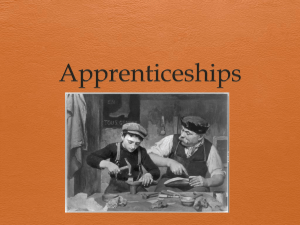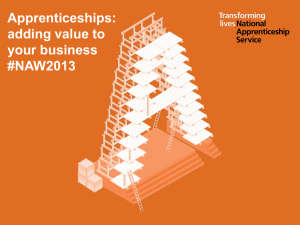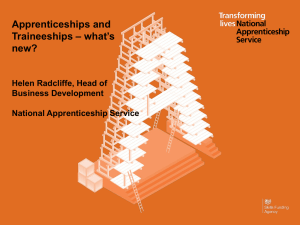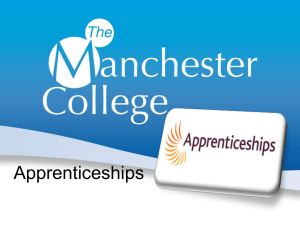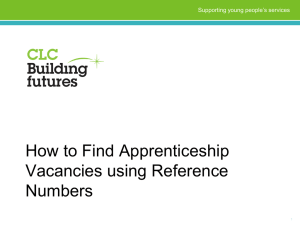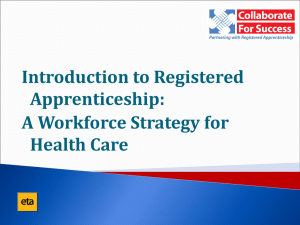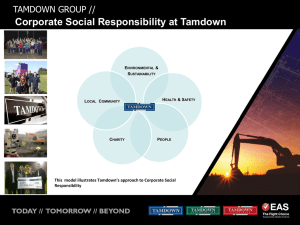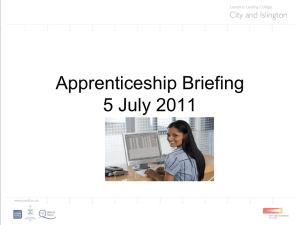Apprenticeships-at-Cambridge-Regional
advertisement
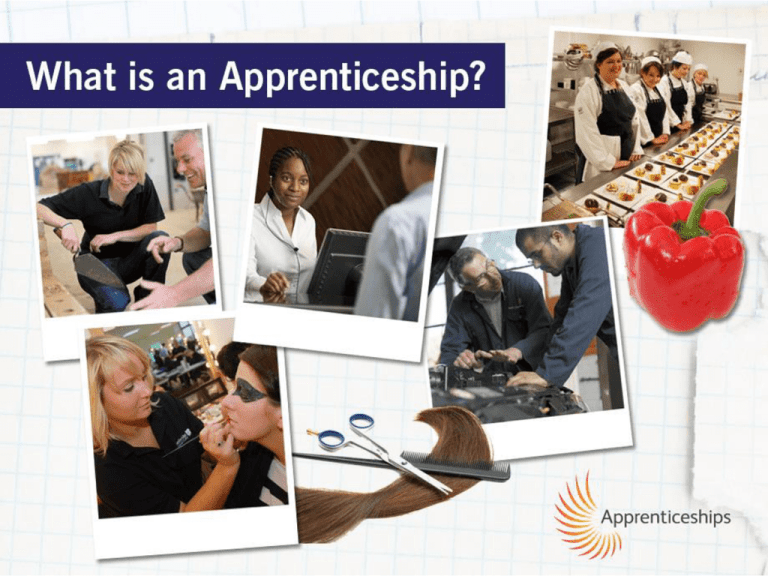
Gold Standard of Work-Based Learning • A great way to EARN whilst you LEARN • Training and skills that employers want and need • Professionally recognised qualifications • 85% of Apprentices stay in employment Gold Standard of Work-Based Learning Types of Apprenticeships http://www.apprenticeships.org.uk/types-ofapprenticeships.aspx Gold Standard of Work-Based Learning • You will need an employer to start an Apprenticeship and we will support you trying to find one • You maybe required to attend college one day a week • An assessor will visit you at your place of work to continue developing your skills • Being an Apprentice has never been more rewarding • Apprentices need to be employed for a minimum of 30 hours a week and have a contract of employment. • The employer must be willing to allow you time off for study for duration of the Apprenticeship. • CRC checks all employers for suitability prior to the commencement of your Apprenticeship. • Apprentices are paid a minimum of £2.68 per hour, our vacancies average between £140 £250 per week (£3.78 - £6.75). There are three levels of Apprenticeships Higher Apprenticeship • NVQ/Certificate/Diploma Level 2* in chosen occupation • Technical Certificate (may require you to come to college one day per week) • Functional Skills in English, Maths and IT at Level 1 or 2 • Employment Responsibilities and Rights • Personal Learning and Thinking Skills *Level 2 is equivalent to five GCSEs at grades A-C • NVQ/Certificate/Diploma Level 3* in chosen occupation • Technical Certificate (may require you to come to college one day per week) • Functional Skills in English, Maths and IT at Level 2 • Employment Responsibilities and Rights • Personal Learning and Thinking Skills *Level 3 is equivalent to 2 A-Level passes Higher Apprenticeships • NVQ/Certificate/Diploma Level 4 or 5* in chosen occupation • Technical Certificate (may require you to come to college one day per week) • Functional Skills in English, Maths and IT at Level 2 • Employment Responsibilities and Rights • Personal Learning and Thinking Skills *Level 4/5 is equivalent to Foundation Degree / first year of degree • Intermediate Apprenticeship can last anywhere from 12 to 24 months • Advanced Apprenticeship can last anywhere from 18 to 36 months • You are able to fast track and progress more quickly if you complete targets and work hard • • • • • • • • • • • • • • • Accountancy Beauty Therapy Bricklaying Business & Administration Carpentry (Site and Bench) Catering & Hospitality Customer Service Distribution & Warehousing Early Years (Childcare) Electrical Installation Engineering (various) Facilities Management Hairdressing / Barbering Health & Social Care Heating & Ventilating • • • • • • • • • • • • Human Resources IT (for Users and Professionals) Laboratory Science Motor Vehicle Maintenance Painting & Decorating Plastering Plumbing Retail Sales & Telesales Social Media & Digital Marketing Supporting Teaching & Learning Team Leading / Management • • • • • Looking in newspapers Cold calling local companies CV/letter Contacts - family and friends Online – CRC advertises all our apprenticeship vacancies on our website http://www.camre.ac.uk/apprenticeships/app renticeship-traineeship-vacancies/ • Check if your local college can help • Register with and regularly check the vacancies on the National Apprenticeship Website www.apprenticeships.org.uk Case Study: Laboratory Apprenticeship Paul Robinson, Laboratory Analyst at Melbourn Scientific “Before I started, I didn’t realise that apprenticeships were also for the adults in full time work. I thought that they were just for school leavers. I wish I had done it from school now because these days experience in the workplace counts for a lot as well as getting qualifications. You get a massive head start.” Case Study: Kiely Barry Hospitality Supervision & Leadership Apprenticeship “I am more confident, I know a lot more about my job and I now understand why I need to do what I do. I realised that I am capable of a lot more and I will be going on to further education in September. My college tutor was a great help, not only with the course but she helped me with my applications for university, she gave me support for my work life, my college work and my personal life.” Case Study: Accounting Apprenticeship Thomas Lyon, Treasury & Purchase Ledger Assistant at CRC “I chose to do an apprenticeship because there is a clear progression route and provides valuable work experience. I started on a level 2 accounting apprenticeship, progressed to level 3 and I am now doing level 4. On completion, it will be a natural progression route to undertake a Chartered Accountancy course. I feel that I have better employment prospects now.”
